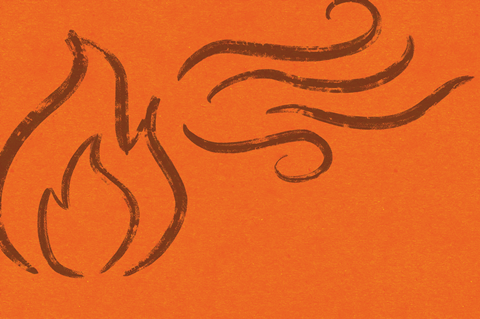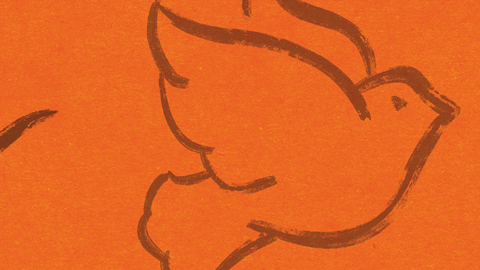Jesus’ call is clear: Go into all the world. But first – wait. It’s a strange command that echoes through scripture, where fire and wind signal God’s presence but never arrive according to our schedule. As Pentecost approaches, Tyler Staton invites us to rediscover the surprising rhythm of Spirit-led mission
Contrary to popular belief, Easter is not a one-day holiday, but a nearly 50-day festival, also known as Eastertide. The resurrection celebration actually rages on for seven weeks, as the Church commemorates the appearances of Jesus to his disciples, Christ’s ascension to heaven and the gift of the Holy Spirit at Pentecost.
Go or stay?
Matthew, Mark and John all end their Gospels with Jesus sending the disciples into the world. His instruction to “go” (Mark 16:15) has become known as the Great Commission.
But Jesus’ final instructions to his disciples in Luke is different – and it’s a bit of a head-scratcher. Here, Jesus says: “I am going to send you what my Father has promised; but stay in the city until you have been clothed with power from on high” (Luke 24:46-49). In the ancient Greek, ‘stay’ is kathizo, which literally means “sit down”. Isn’t that the exact opposite of ‘go’?
Luke’s sequel, the book of Acts, continues this thought. In Acts 1:3-4, Jesus tells his disciples: “Do not leave Jerusalem, but wait for the gift my Father promised, which you have heard me speak about” (my emphasis).
The message of the risen Jesus to his followers seems to be: “Go, but wait.”
But Jesus doesn’t just tell his disciples to wait, he says: “Wait for the gift my Father promised” (my emphasis). Likewise, at the close of Luke’s Gospel, Jesus doesn’t just say, ‘stay’. He says: “Stay in the city until you have been clothed with power from on high” (my emphasis).
The ‘gift’ and ‘power’ named here is the Holy Spirit – the third person of the Trinity. Jesus ascended to the right hand of the Father so that the Spirit might descend into the lives of all his followers.
Fire and wind

The Spirit fills broken people like you and I with power and gifts to bring Jesus’ kingdom to earth. And, for those sent-but-waiting disciples, this culminated in the day of Pentecost, when they were all together in the upper room, and the “blowing of a violent wind…filled the…house” and “tongues of fire…came to rest on…them” (Acts 2:1-3).
Fire and wind are also found in key moments throughout the Bible, symbolising God’s power and presence among his people. The opening lines of the Bible read: “In the beginning God created the heavens and the earth. Now the earth was formless and empty, darkness was over the surface of the deep, and the Spirit of God was hovering over the waters” (Genesis 1:1-2). The word ‘Spirit’ here is the Hebrew ruakh, which can also be translated as ‘wind’. In Genesis, creation is depicted as what happens when the wind of God blows over the waters of chaos. And, at the conclusion of Genesis, people inhabit Eden, a heaven-on-earth spot whose entrance is guarded by fire.
The mistake many of us make when it comes to Pentecost is to yearn for the spectacle without counting the cost
In the Exodus story, God’s presence is described as a dense cloud. But the first appearance of this cloud occurs at the parting of the Red Sea, when “the Lord drove the sea back with a strong east wind and turned it into dry land” so that the Israelites could pass through safely (Exodus 14:19-22). Again, the same word – ruakh – is used.
This theme of fire and wind continues through the Exodus story. A cloud guides God’s people to freedom, blowing like the wind to rescue them and glowing like fire in the dark. The cloud directs them through the desert. It descends on Mount Sinai when God meets with Moses face to face.
To tabernacle
In the final scene of Exodus, God instructs Moses to build a tabernacle, where he will dwell with his people: “Then the cloud covered the tent of meeting, and the glory of the Lord filled the tabernacle…the cloud of the Lord was over the tabernacle by day, and fire was in the cloud by night, in the sight of all the Israelites during all their travels” (Exodus 40:34,38).
John tells us: “The Word became flesh and made his dwelling among us. We have seen his glory, the glory of the one and only Son, who came from the Father, full of grace and truth” (1:14). The Greek word used for ‘dwelling’ is skenoo, which also means ‘tabernacle’. So, the most direct translation is: “The Word became flesh and tabernacled among us.”
In the Old Testament, God’s people were instructed to build a tabernacle, which God filled with his Sprit. Now John describes Jesus as a tabernacle filled with God’s Spirit. The Spirit of God now dwells not just “among us” but within the body of Jesus. He is the living, breathing, walking, talking tabernacle.
Not only that, but the Gospels point towards a day when the same Spirit ‘tabernacling’ in Jesus would ‘tabernacle’ in all his followers. And the Gospel writers make that promise through familiar metaphors – fire and wind. John the Baptist, sent to prepare the way for Jesus, said: “I baptise you with water. But one who is more powerful than I will come, the straps of whose sandals I am not worthy to untie. He will baptise you with the Holy Spirit and fire” (Luke 3:16). The word ‘Spirit’ here is the Greek pneuma which translates equally as ‘wind’. So John the Baptist is saying: “One is coming who will baptise his people in fire and wind.”
Jesus also says to his disciples in Acts 1:5: “In a few days you will be baptised with the Holy Spirit.” A fire and wind baptism. That’s what Jesus said was coming. That’s what the disciples were waiting for when the Day of Pentecost finally came. At Pentecost, the very same Spirit of fire and wind that blew over the waters at creation, over the Red Sea at Exodus, that filled the tabernacle and that filled Jesus, came to make a home within all who followed Jesus.
The apostle Paul writes in 1 Corinthians 3:16: “Don’t you know that you yourselves are God’s temple and that God’s Spirit lives among you?” There’s still a tabernacle; a place in the world where God’s Spirit dwells. It’s in us, in the gathered Church, in the collective lives of Jesus’ followers.
Paul later writes in the same letter: “Do you not know that your bodies are temples of the Holy Spirit, who is in you, whom you have received from God?” (3:19). Your individual, physical body is filled with the fire and wind that filled the Exodus tabernacle and the body of Jesus Christ. You are the here-and-now dwelling place of God through the Holy Spirit.
Waiting on the Spirit
‘Pentecost’ is the Greek translation of the Hebrew word Shevote, meaning ‘The Festival of Weeks’. It was one of three Jewish festivals outlined in the law given in Exodus. During this time, Jewish people would travel from every corner of the Roman Empire to Jerusalem, bringing first-fruits of the harvest as a thank offering to God.
In Acts 2, the entire nation was gathered in one city – people from every tribe, language and class. If you wanted to say something that would make its way to the ends of the earth, you couldn’t pick a better day. When tongues of fire descended on that upper room, and the disciples started proclaiming the life of Jesus, miraculously, the crowd – made up of many tribes and languages – all heard them in their own dialect. Jesus waited for the Day of Pentecost because this gift of the Holy Spirit is for everyone who believes.
Stop asking God to join your plan and start asking how to join his
The climactic events of Jesus’ life are supercharged with meaning. His death occurs at Passover and the Spirit is given at Pentecost. The gift of the Spirit is the fulfilment of generations of people celebrating God’s generosity at each harvest season. And now comes the generous gift of God’s very person – the abundance to which Shevote has always pointed.
Kingdom power
Today, that promise remains – but so do Jesus’ instructions. We need to wait on the Holy Spirit before we go.
There is great danger in attempting the work of the kingdom apart from the power of the Spirit, because something changes dramatically when you stop asking God to join your plan and start asking how to join his.
In Acts, Jesus tells his disciples: “You will receive power when the Holy Spirit comes on you; and you will be my witnesses in Jerusalem, and in all Judea and Samaria, and to the ends of the earth” (1:8). Here, the word ‘witness’ is translated from the Greek martus, from which we get the English ‘martyr’. Sometimes there is a real, physical death for one’s faith – much like Jesus on the cross. But always, there’s a living kind of dying for us all.
Radical generosity
We are also told in Acts 2:44-45 that the believers “had everything in common. They sold property and possessions to give to anyone who had need.” When people think of a Spirit-empowered community, many might imagine signs and wonders. Others might picture hospitality for neighbours and strangers alike. But how many of us would imagine selling the house we just bought to meet the practical needs of someone else at church?
A Spirit-empowered life begins with a Spirit-shaped imagination
This type of radical generosity was the norm in the early Church, which had the audacity to make Jesus’ teaching – including the approximately 25 per cent of it about wealth and possessions – the script for their lives. If the hungry came to the early Church and they didn’t have food to offer them, the entire community would fast until they had enough to share a meal together. Material wealth became nothing more than a rental, which they spent joyfully on behalf of others.
Willing to suffer
The mistake many of us make when it comes to Pentecost is to yearn for the spectacle without counting the cost.
The sacrificial death Jesus said we’d all follow him into is called his ‘passion’. The Latin root of the word means ‘willing to suffer for’. Everyone who’s ever shaped history did so through suffering. They had something outside of their self which was worth suffering for. What are we passionate about? And what are we willing to suffer for?
In Acts 1:6, Jesus’ disciples ask him: “Lord, are you at this time going to restore the kingdom to Israel?” The disciples want Jesus to make their own world right. Jesus tells them they will be his witnesses “to the ends of the earth” (Acts 1:8) – in order to make the whole world right. This is a more personal, more beautiful and more participatory way of redeeming the world than the disciples had even dared to imagine.
In our own unique ways, we fall prey to the same confined, small imagination of the disciples. A Spirit-empowered life begins with a Spirit-shaped imagination. We have to wait on the Spirit because we are forever tempted to a good but too small vision of where, how and among whom God is working.
But the same Spirit that convicts of a confined imagination expands the vision of those who surrender. So, as we approach another Pentecost, awaken your wonder, open your eyes and join in.
God promises to clothe us with power from on high. If we want to receive the gift the Father promised, we must wait to be sent by the Spirit, who leads and guides his waiting, praying people.
Tyler’s latest book The Familiar Stranger (Hodder & Stoughton) is out now. You can listen to our interview with Tyler on ‘The Profile’ podcast at premier.plus/tylerstaton




































No comments yet